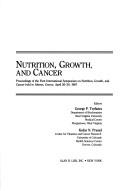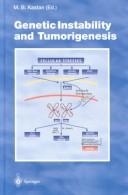| Listing 1 - 2 of 2 |
Sort by
|

ISBN: 0845151096 Year: 1988 Volume: vol 259 Publisher: New York (N.Y.) : Liss,
Abstract | Keywords | Export | Availability | Bookmark
 Loading...
Loading...Choose an application
- Reference Manager
- EndNote
- RefWorks (Direct export to RefWorks)

ISSN: 0070217X ISBN: 3540615180 9783540615187 3642644341 3642605052 Year: 1997 Volume: 221 Publisher: Berlin : Springer,
Abstract | Keywords | Export | Availability | Bookmark
 Loading...
Loading...Choose an application
- Reference Manager
- EndNote
- RefWorks (Direct export to RefWorks)
M. B. KASTAN Cancer is a disease resulting from alterations of cellular genes which cause phe notypic changes in somatic cells. Usually, when we think about genetic diseases, we think about inheriting one or two abnormal genes from our parents and these gene abnormalities confer the disease phenotype. In contrast, in the majority of cancers, no such inherited gene abnormalities can be identified (which does not mean that they do not exist) and there is no obvious family history suggesting an inherited disease. The vast majority of genes which are altered in the cancer cells are not transmitted through the germ line, but rather become abnormal in somatic cells sometime during the lifetime of the individual. Thus, the critical question which arises is "how do these genetic changes occur in somatic cells?". Epidemiologic data suggest that exposure to environmental carcinogens con tributes to the genesis of at least 80% of all human cancers (DOLL and PETO 1981). Thus, it is natural to suspect that the genetic changes in somatic cells which con tribute to the transformed phenotype arise from DNA damage caused by such exposures. Therefore, understanding how cells respond to DNA-damaging agents is likely to be an important component of our understanding of the genesis of human tumors.
Cancer--Pathogenesis --- Carcinogenese --- Carcinogenesis --- Carcinogénèse --- Congenital diseases --- Disorders [Genetic ] --- Disorders [Inherited ] --- Désordres génétiques --- Genetic diseases --- Genetic disorders --- Genetische stoornissen --- Hereditary diseases --- Inherited diseases --- Kanker--Ontstaan --- Oncogenesis --- Pathogenesis of cancer --- Stoornissen [Genetische ] --- Troubles génétiques --- Tumorigenesis --- Tumors --- DNA repair. --- Neoplasms --- DNA Damage. --- DNA Repair. --- Mutagenesis. --- Genetic aspects. --- Genetics. --- Etiology. --- Dna damage --- DNA repair --- genetics --- Dna damage. --- genetics. --- etiology. --- Cancer research. --- Cell biology. --- Biochemistry. --- Environmental health. --- Cancer Research. --- Cell Biology. --- Biochemistry, general. --- Environmental Health. --- Environmental quality --- Health --- Health ecology --- Public health --- Environmental engineering --- Health risk assessment --- Biological chemistry --- Chemical composition of organisms --- Organisms --- Physiological chemistry --- Biology --- Chemistry --- Medical sciences --- Cell biology --- Cellular biology --- Cells --- Cancer research --- Health aspects --- Environmental aspects --- Composition --- Deoxyribonucleic acid repair --- Repair, DNA --- Repair mechanisms in DNA --- Biochemical genetics --- Antimutagens --- Cancer --- Pathology --- Genetic toxicology --- Pathogenesis
| Listing 1 - 2 of 2 |
Sort by
|

 Search
Search Feedback
Feedback About
About Help
Help News
News